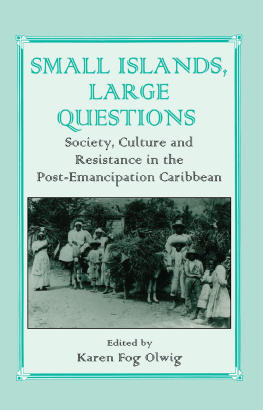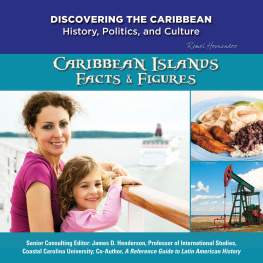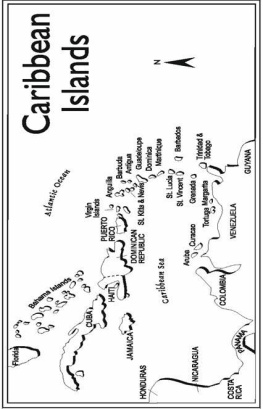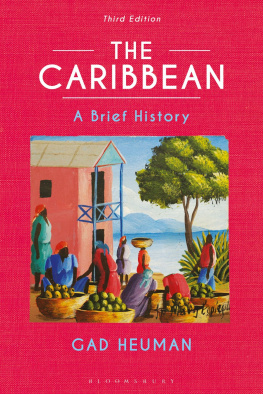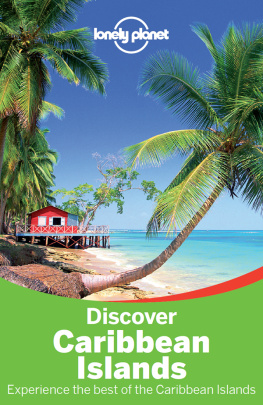CASS SERIES: STUDIES IN SLAVE AND POST-SLAVE SOCIETIES AND CULTURES
(Series Editors: Gad Heuman and James Walvin)
SMALL ISLANDS, LARGE QUESTIONS
Also in this series
The Slaves Economy: Independent Production by Slaves in the Americas
Edited by Ira Berlin and Philip D. Morgan
The Economics of the Indian Ocean Slave Trade in the Nineteenth Century
Edited by William Gervase Clarence-Smith
Out the House of Bondage: Runaways, Resistance and Marronage in Africa and the New World
Edited by Gad Heuman
Unfree Labour in the Development of the Atlantic World
Edited by Paul E. Lovejoy and Nicholas Rogers
Reconstructing the Past: Blacks in Britain, c. 17801830
Norma Myers
The Human Commodity: Perspectives on the Trans-Saharan Slave Trade
Edited by Elizabeth Savage
The Wages of Slavery: From Chattel Slavery to Wage Labour in Africa, the Caribbean and England
Edited by Michael Twaddle
SMALL ISLANDS, LARGE QUESTIONS
Society, Culture and Resistance in the Post-Emancipation Caribbean
Edited by
Karen Fog Olwig
First published 1995 by
FRANK CASS & CO. LTD.
Published 2013 by Routledge
2 Park Square, Milton Park, Abingdon, Oxon OX14 4RN
711 Third Avenue, New York, NY, 10017, USA
Routledge is an imprint of the Taylor & Francis Group, an informa business
Copyright 1995 Frank Cass & Co. Ltd
British Library Cataloguing in Publication Data
Small Islands, Large Questions: Society
Culture and Resistance in the Post-Emancipation Caribbean. (Studies in Slave & Post-slave Societies & Cultures)
I. Olwig, Karen Fog II. Series
306.097297
Library of Congress Cataloging-in-Publication Data
Small islands, large questions : society, culture and resistance in the post-Emancipation Caribbean / edited by Karen Fog Olwig.
p. cm. (Studies in slave and post-slave societies and cultures)
Papers originally presented at a workshop held in Magles, Denmark, in August 1992.
Includes bibliographical references and index.
1. Leeward Islands (West Indies) Social conditions. 2. Leeward Islands (West Indies) Economic conditions. 3. Freedmen Leeward Islands (West Indies) 4. Slaves Emancipation Leeward Islands (West Indies) I. Olwig, Karen Fog, 1948 . II. Series.
HN244.A8S6 1995
306 .09729dc20
95-14437
CIP
ISBN 13: 978-0-714-64576-6 (hbk)
ISBN 13: 978-0-714-64225-3 (pbk)
All rights reserved. No part of this publication may be reproduced, stored in a retrieval system or transmitted in any form or by any means, electronic, mechanical, photocopying, recording or otherwise, without the prior permission of the publisher.
Contents
Karen Fog Olwig
B.W. Higman
Susan Lowes
Riva Berleant-Schiller
Jean Besson
Karen Fog Olwig
Gad Heuman
George F. Tyson
Elizabeth M. Thomas-Hope
David Lowenthal
Acknowledgement
The editor wishes to express her appreciation to the Carlsberg Foundation for its support of this project.
Introduction and Historiography
KAREN FOG OLWIG
The post-emancipation era was a formative time for the Caribbean societies of today. Yet it remains little examined: the social sciences have concentrated mainly on present-day societies, whereas historical research has largely been devoted to slavery. The long post-emancipation period, when local societies adjusted to the social and economic conditions of a free labour force and the emancipated attempted to create a new life of their own, has not been subject to similarly extensive and rigorous research.
Small Islands, Large Questions seeks to remedy this gap in Caribbean research.1 Our particular focus is on the English-speaking Leeward Islands, whose small size makes them especially well suited to case studies of the economic, social, and cultural processes which link the pre-emancipation and the contemporary Caribbean. The regional variation displayed by the individual islands, furthermore, makes them a good starting point for comparative analysis. The authors in this volume, who represent a wide range of disciplines, notably history, geography, and anthropology, have all carried out extensive research in the Caribbean. They share a common interest in discussing their work in a broader regional context and from an interdisciplinary point of view.
Post-emancipation historiography, as Barry Higman suggests, has tended to highlight the transformation of the slave population into a free labour force and to focus narrowly on the social and economic ramifications this change had for the sugar plantations. The freed slaves have thus been largely reduced to the status of workers, and their widespread attempts to acquire land on which to settle have been examined mainly as a threat to the existing plantation systems. The chapters in this book transcend these issues in order to examine the emergence of patterns of life significant for the development of contemporary Caribbean societies.
It is difficult to see how the abolition of slavery gave West Indians of African descent true emancipation, if we take as our point of departure the definition of the verb to emancipate: to free from restraint, control, or the power of another; esp. to free from bondage (Webster 1965). As the writers in this volume amply document, the institution of slavery was largely replaced by subjugation that was indirect yet almost as coercive. Access to land was limited throughout the Caribbean, even in islands with considerable uncultivated land, as Riva Berleant-Schiller shows in her chapter on Montserrat. Strict new labour laws on post-emancipation St. Croix in the Danish West Indies, as detailed by George Tyson, drove the emancipated labourers off the plantations and led to the importation of contract workers from abroad. The cultural barriers that commonly restricted social and economic mobility are analysed in Susan Lowess chapter on Antigua and mine on Nevis.
It is easier to grasp the realities of emancipation, however, if the primary etymological definition of to emancipate is used: to release from paternal care and responsibility and make sui juris (ibid.). With emancipation the former slaves were made legal persons who had to fend for themselves. This book instances numerous examples of the removal of the privileges slaves had previously had under the care of their owners. Tyson and Berleant-Schiller illustrate how emancipation abrogated the customary right to cultivate provision grounds on estate land, removed access to free food and medical care, and curtailed rudimentary support for education.
In summary, the emancipated were expected to have legal capacity as independent citizens while the informal customary rights which they had formerly received now had to be paid for by deductions in wages. Simultaneously they were placed under severe restraint and control by the plantocracy, leaving them with a narrow social and economic base from which to exercise the legal rights of free citizens. The social and economic problems experienced by the freed were exacerbated where contract labourers were imported to replace the native labour force. This was the case on St. Croix, as George Tyson shows, where labourers from the British West Indies were used on the sugar plantations. The presence of a large foreign labour force played an important role in the uprising that broke out there in 1868. Similar forms of violent resistance against the planter regimes occurred in many other West Indian societies at this time; Gad Heuman reviews some of these riots and disturbances in the post-emancipation Caribbean. He concludes that the contradictory expectations of freedom held by the ruling class and by the emancipated were largely responsible for the violence.

